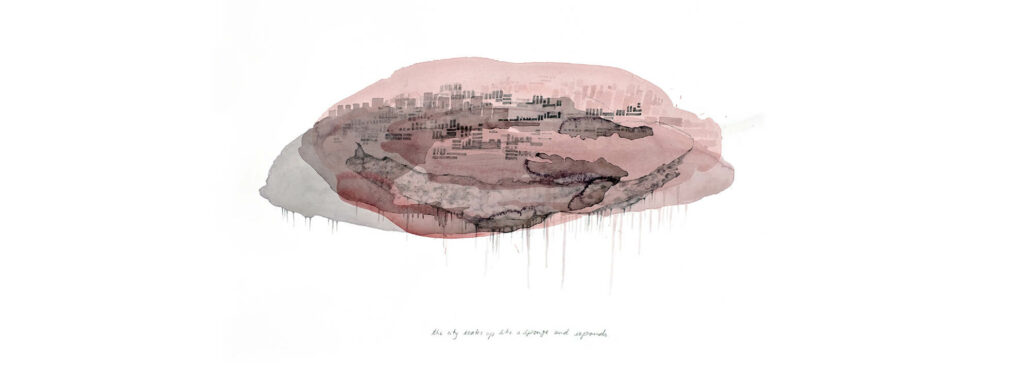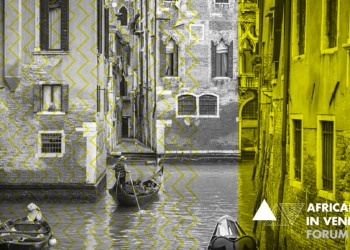Multi-disciplinary conference of panels and performances aims to bring the complex history, and rich cultural heritage of the Indian Ocean rim to an international audience, December 14-16, 2023 in Sharjah, UAE

Naiza Khan, The City Soaks Up Like a Sponge and Expands, 2011. Ink and Watercolour on Arches. Photographer: Mehmood Ali
This December, The Africa Institute, of the Global Studies University (GSU), continues its series of conferences on the subject of the Indian Ocean, the third edition of the Institute’s annual initiative exploring one African country or African diaspora community through a range of scholarly and public programs. From December 14-16, the symposium titled Colourful Threads: The Interwoven Worlds of Art and Culture in the Western Indian Ocean will take place in Sharjah and will include performances and four-panel discussions led by scholars around the world. The panel topics include Women, Feminism and the Indian Ocean, Material Connections and Rupture, Cinema and Placemaking, and Representations and Imaginaries. Free and open to the public, the conference will also be live streamed on their official YouTube page. The schedule of programs and panelists will be available at TheAfricaInstitute.org.
Colourful Threads revolves around the Islands of the Western Indian Ocean region, stretching from the Eastern African coasts of Kenya, Mozambique, Somalia, South Africa, and Tanzania to Comoros, Madagascar, Mauritius, Seychelles, Mayotte, and Reunion, each brimming with historical, socio-cultural, and economic significances. These Islands are not only creolized entities, but also important sites of creativity and imagination as evidenced in both symbolic and material cultures such as those expressed in the diversity of languages, ethnicities, rites, and performances, among other artistic forms of human expressions. Nowhere have the influences of the Indian Ocean circularities been more powerfully pronounced than in the aesthetic realms of art and cultural production. From the vast array of the rich artistic traditions of music, photography, theatre, dance, ritual life, and spirit possession performances to mention a few, this symposium’s angle on art and cultural production will pivot around key subjects of critical importance to scholars in the humanities and the social sciences.
“Bounded by the continents of Africa, Asia, and Australia, the Indian Ocean has been a critical route for centuries bearing witness to remarkable circularities. With this season’s focus, diverse scholars highlight the multitudinous forces shaping Africa’s Indian Ocean islands, enabling us to interpret Africa’s history, understand its present, and imagine its future,” said Dr. Salah M Hassan, Director, The Africa Institute Sharjah.
Colourful Threads is part of a four-part conference season titled Thinking the Archipelago: Africa’s Indian Ocean Islands, organised by The Africa Institute in collaboration with leading scholars Jeremy Prestholdt, Professor of History at the University of California, San Diego; Rogaia Mustafa Abusharaf, Professor of Anthropology, Georgetown University in Qatar; and Uday Chandra, Assistant Professor of Government, Georgetown University in Qatar. This symposium is co-organised by Prita Meier, Associate Professor of Art History at New York University, and Laura Fair, Professor of African History in the Department of Middle Eastern, South Asian and African Studies at Columbia University.
“The Indian Ocean world is one of the most dynamic places of the world, where diverse peoples, ideas, and materials converge to transform each other. The architectures, artworks and artists of this region have long transcended boundaries. This symposium brings scholars together from diverse fields and disciplines to reposition the Indian Ocean world at the center of global art history. Their contributions will address pressing issues regarding the cultural dimensions of globalization by foregrounding the significance of oceans and maritime environments in shaping our world. Individual papers will thematize such diverse topics as the oceanic mobility of photography, the transcultural reach of island architecture, and cinematic representations of archipelagic lifeworlds,” said co-convenor Prita Meier, Associate Professor of Art History at New York University.
Following two successful seasons focused on Ethiopia and Ghana in 2019 and 2022, respectively, The Africa Institute chose the Indian Ocean region due to its significance as the ‘cradle of globalization’ and ‘center stage’ in the contemporary multipolar world 1 . This season invites scholars, activists, and others to center Africa within studies of global relations and aims to raise the profile of Indian Ocean societies, bringing the complex history and rich cultural heritage of the Indian Ocean to an international audience.
The Indian Ocean season thus far has completed two successful iterations dedicated to Africa’s Indian Ocean rim with themes on “Reimagining Mobilities/Immobilities in the Indian Ocean”, which took place in December 2022 in Sharjah, UAE, followed by “Legacies of Race and Slavery in the Atlantic and Indian Oceans”, held between June 12-14, 2023 in Zanzibar. The final conference of the Indian Ocean season titled “Intertwined Ecologies and Interconnected Histories: The Indian Ocean Rim” will be held in Mauritius in 2024.
The Islands have always been integral spaces of exchange. As crucial points of contact with societies within and beyond Africa, they have been the primary conduits through which people, goods, and ideas move, especially in the context of the monsoon and maritime worlds.
From Madagascar’s immense scale and ecological diversity to Mozambique Island’s compact, urban environment and Mombasa’s centrality to the East African economy, islands have profoundly shaped African history. Social environments of islands such as Zanzibar, Lamu, Seychelles, Mauritius, and Comoros have contributed to unique forms of literary production, music, dance, film, aesthetics and art forms in dialogue with continental and more distant societies. Islands have also faced a range of environmental challenges, from cyclones and tsunamis to rising sea levels and the devastation of marine ecologies due to climate change.
The Africa Institute (GSU), created this annual series to highlight the complex history of the African world while also providing a forum for creatively engaging its present and imagining new futures. Inaugurated with Ethiopia: Modern Nation/Ancient Roots in 2019-2020 followed by Global Ghana in 2021-2022, the country-focused seasons are an integral part of The Africa Institute’s year-round work to develop and support original scholarship and programming that expands understanding of African and African diaspora studies among the academic community and the broader public.



